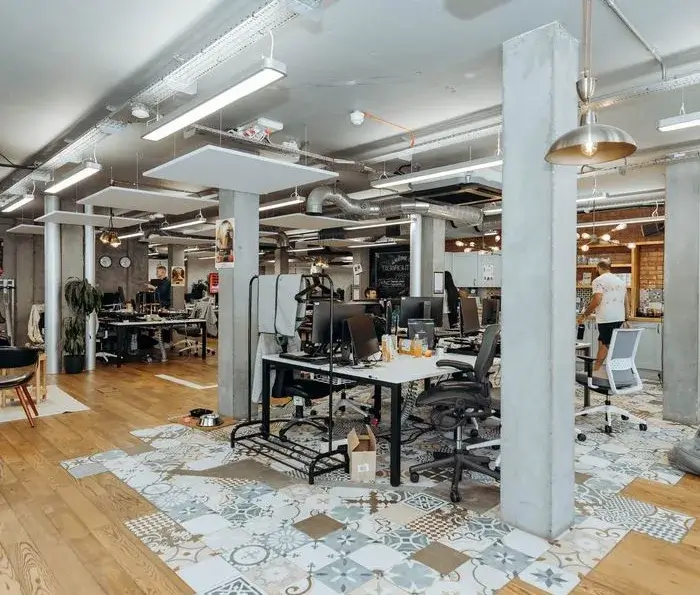Returning to the office: How businesses are preparing and reprioritising since COVID-19
COVID-19 has caused a seismic shift across all businesses and begs the question: what role does the office have to play in the future of work? And what factors have jumped to the top of business priorities when it comes to the future of your workspace?
These are enormous concerns across all sectors right now.
That’s why we’ve conducted a survey of over 391 decision-makers of office space across 13 different industry sectors, covering 10 different UK regions, to answer these daunting questions for you. You’re welcome!
You can read the full findings in our White Paper, hot off the press here. In a nutshell, though, the findings show us three important things:
1. How the workplace impacts its people is the most important thing.

33% of businesses said that the most useful information they can have right now is ‘How can I ensure my people remain happy, healthy and safe?’
Providing you haven’t been living under a rock, you’ll be familiar with the term ‘working from home’. Remote-working is something businesses have been forced to embrace at a rapid rate to prioritise their employees’ health first and foremost. But it isn’t the answer for everyone: if you’re not able to separate work and home commitments, juggle being a parent/ carer/ worker, or you simply don’t have an office at home.
It isn't surprising that compared to before, the following factors will bear a much larger weight when it comes to enticing your employees back to the workspace:
According to our research, employees’ wellbeing will be of pivotal importance in the return to work. Deloitte’s 2020 Global Human Capital Trends Report found that 79% of businesses saw a surge in employee requests for greater mental health support as a result of COVID-19.
The White Paper revealed that across the board, businesses top concern is implementing affective social distancing measures in the office.
Transforming breakout spaces into smaller sectioned-off work environments, screens between desks, and fresh air ventilation are all examples of effective social distancing measures.
Employees productivity boosts morale. Morale boosts productivity. This is something business-heads have been aware of and for the most part, actioned for Time immemorial. Now, however, businesses will put more emphasis on this than ever before. How, you ask?
By investing in updating their technology.

Technology can enable collaboration as well as mental, physical, and emotional support. According to our survey, 20% of businesses felt that better technology would facilitate higher levels of productivity.
To find out more about how closely intertwined technology and the future of the office is, you can check out this blog.
2. Not all industries are affected in the same way.
Unsurprisingly, the Pandemic has impacted different industries, sectors and businesses sizes differently.
Workspace relocation is widely region dependent
36% of those in London are looking to leave the City. And many of those looking to move are after more flexible contracts. Whereas those respondents from outside of London were unsure at present whether to relocate.
Workspace changes vary from sector-to-sector
Blue-collar sectors are more likely to move than before, particularly in the construction (33%) and utilities (40%) sectors. One reason for this could be that these sectors tend to consist of larger workforces that would benefit from splitting into smaller capacity flexible workspaces.
3. Businesses are openly embracing flexible working on a larger scale.
With greater veracity than before, we can see the objectives of a business - to turn a profit and to retain the best employees - aligning. The following considerations have ascended to the top of agendas nationwide:

Is it cost-efficient to stay put, downsize or move?
The best answer to this must take into account many factors: physical, geographical, and mental. That’s a minefield of considerations - and we understand that. One thing is for sure, though. The future of workspaces will be built on foundations of physical and financial flexibility.
What do we mean by this? Physical spaces that you can chop and change at your will. Financially speaking, we mean…
The need for flexible contracts has doubled as a result of COVID-19. Flexibility can come in many forms, from late start dates to staggering a deposit.
Many flexible workspace providers were ahead of the game with contractual affability and therefore, are rising to the challenge for this increasing demand.
Sustaining employee morale.
Even in the pre-Pandemic world, Deloitte’s 2020 Global Human Capital Trends Report found 80% of respondents claim that fostering a sense of community was essential to ensuring an organisation’s success in the coming 12-18 months. Employee wellbeing and productivity are a bit like the chicken and egg argument. It’s hard to pinpoint which one comes first.
The main takeaways…

More than ever before, business and employee needs equate to the same thing. Looking after one will ensure the other can thrive.
It’s important for you to consider how your workspace is working for you. Is it financially the best option for you to move or stay put? How are you enticing your employees back to the office? Are you using technology to its full potential in the office?
The future of workspaces will be built on foundations of physical and financial flexibility. Flexible contracts are on the up and they’re not slowing down anytime soon.
Here at Flexioffices, we have always known the office is more than just four walls. We understand that considering your geographical, physical, and emotional needs is a minefield at the best of times, let alone during the current climate.
But there’s no need for you to tackle them alone. With 18 years of expertise in the flexible market industry, we can help. Contact us today.




















